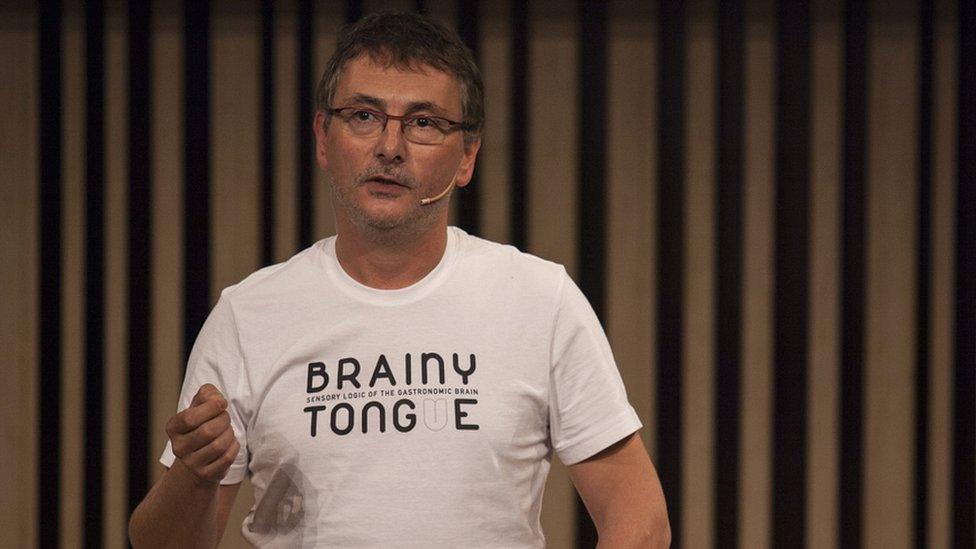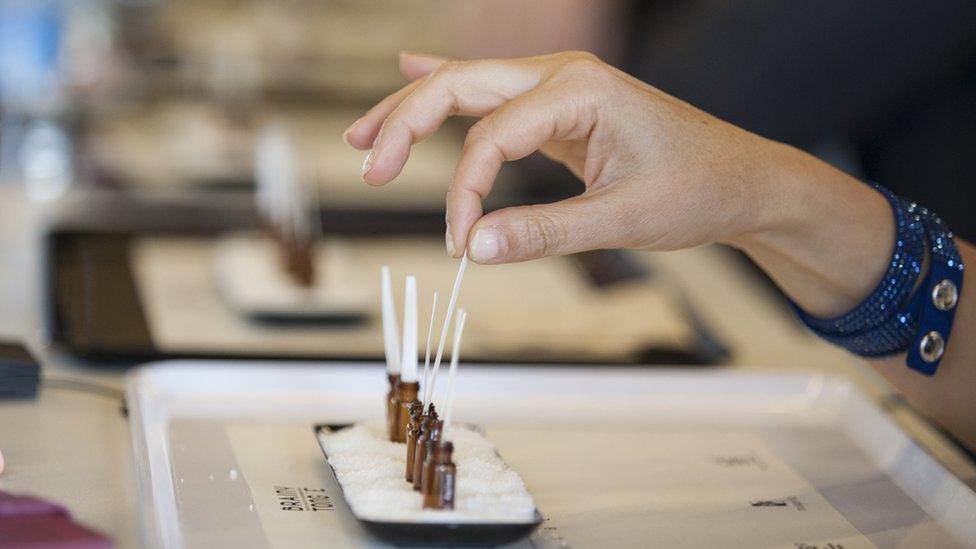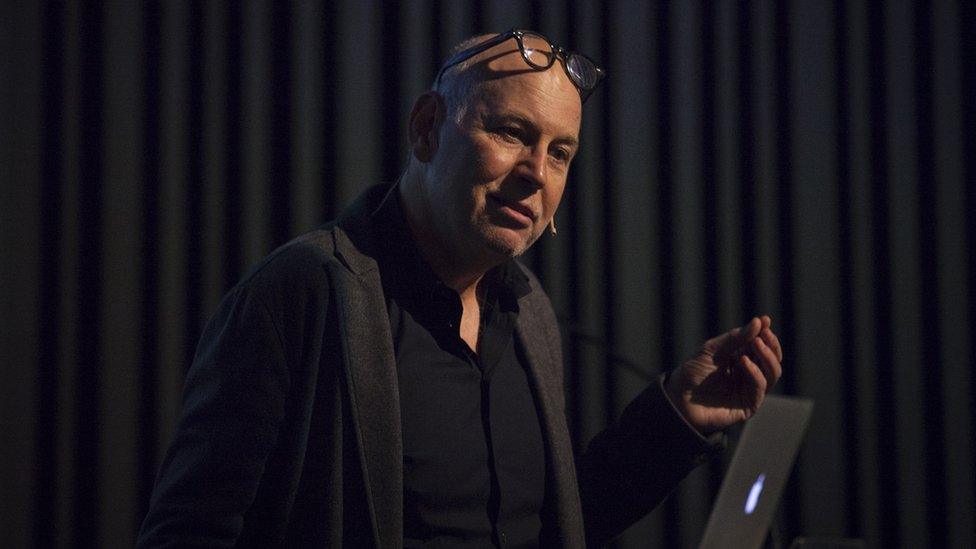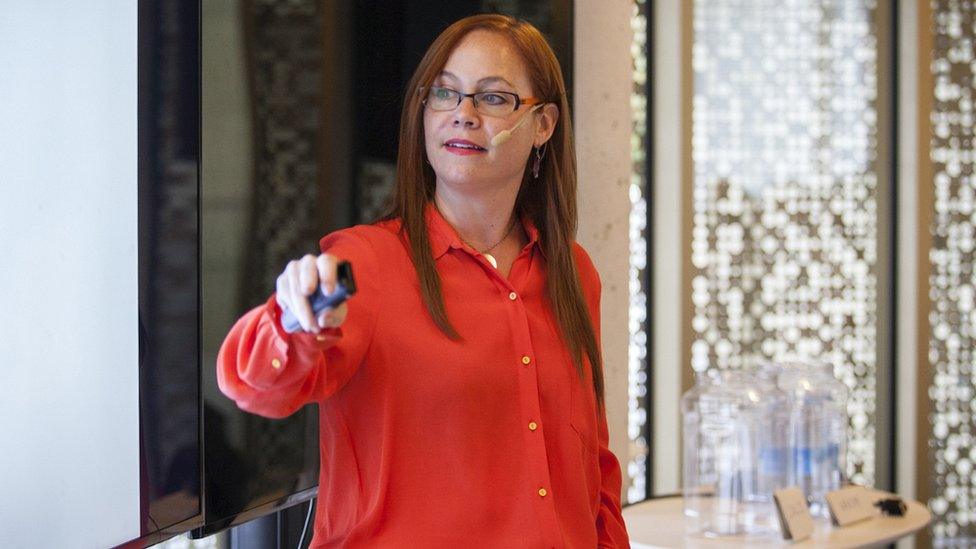Why do we love and hate different tastes?
- Published
Sean Coughlan reports for Radio 4's PM programme on a summit of chefs and scientists
Why do people like one type of food and really dislike another? How much are our responses to food, including putting on weight, influenced by genetics?
And could the taste of food be chemically re-engineered to appeal to particular groups, such as the elderly?
A unique summit of some of the world's leading chefs and top scientists put our complicated relationship with food under the microscope.
This "Brainy Tongue" experiment, a collision of science and cooking, took place in San Sebastian in the Basque region of northern Spain, a seaside resort famous among food lovers for its Michelin-starred restaurants.
It was staged at the Basque Culinary Center, a university entirely dedicated to researching food.
'Unpeeling the layers'
Heston Blumenthal might have been a pioneer of scientific precision in the kitchen, but his latest passion is investigating how food can be so strongly linked to memory.
Whether it's the scents of a seaside holiday, ice cream bought as a childhood treat, or a box of cereal, he says a meal can be a way of "unpeeling the layers" of emotions.

Chef Andoni Luis Aduriz said restaurant customers wanted a shared experience
He says: "We bury things, and then when you start talking, 'Do you remember that cereal? Oh yeah, variety packs. I loved it when I got the toy or there was the bag that wouldn't open properly.'
"You have this discussion at the table, you start revealing, you start opening up your own memories, you start opening up with positive nostalgia, the floodgates open."
Mr Blumenthal says he wants to experiment with how a restaurant can use "storytelling" to coax out those memories.
Science of taste
He says chefs need to recognise the brain is the "gatekeeper" for enjoying food and before a mouthful goes near the lips, the brain has made millions of computations.
And his "restless perfectionism" continues to test the "difference between perception and reality".
The same glass of wine can taste different depending on the background music, he says.

The aroma and sight of food have engaged the brain before anything is eaten
And restaurants can manipulate such responses.
Playing loud music makes people eat more quickly, while classical music means people will spend more money on wine, he says.

You can also hear about Heston's advice on what parents can do about fussy eaters and join the debate at the BBC's Family & Education News Facebook page, external.
More stories from the BBC's Global education series, external looking at education from an international perspective, and how to get in touch.

But why are we so different in what we like to eat?
The event in San Sebastian (or Donostia as it's called in Basque) examined the science of taste.
Dr Charles Zuker, a neuroscientist from Columbia University in New York, says all animals are "pre-wired" to prefer sweet tastes to bitter.
"There are no lions out in the wild drinking tonic water," he says.
But Dr Zuker says there are also "acquired tastes", where the social reward outweighs an initial dislike - such as drinking beer and coffee.
'Turn up volume' on tastes
And what makes this mix even more individual is that we all have our own genetic, inherited preferences.
"We have differences because of variations in our genes," he says.
"And that is likely to greatly impact how much sugar I want to have in my coffee.
"It might be that I need six spoons of sugar to get the same level of satisfaction and reward that you get with only two.

Charles Zuker says that food could be customised for the elderly
The next frontier, says Dr Zuker, will be to redesign food to respond to such differences.
For example, it could mean food being specially adapted for older people.
The sense of taste declines with age, and Dr Zuker says there could be a way to "turn up the volume" on flavours.
He says: "How do we tweak the taste receptors in an ageing tongue, in a way that we maximise the signals? This is like a hearing aid for your tongue, like glasses for your eyes.
"We're going to call it either personalised food and health or you can call it precision food, because it's been custom-tailored to your genetic make-up as well as your history of preferences."
Overloading the brain
But what if the problem is liking the taste of food too much?
Dr Dana Small, a psychiatrist and expert on flavour at Yale University, says the human brain, which has evolved over millions of years, struggles to cope with the modern combination of food that is both high fat and high sugar.

Dana Small says that our brains have not evolved to cope with high sugar, high fat food
"In nature, there is no food that is high in both fat and sugar. There is no doughnut in nature," says Dr Small.
"The brain has never seen these two signals arriving at the same time. So what does it do to your brain? Our food has changed in a way that may challenge our physiology."
There is one visible outcome of changing diets - more of us getting overweight.
Blame the genes
But Professor Sir Stephen O'Rahilly, a Cambridge University geneticist, says it is becoming increasingly apparent that weight is often about our genes rather than our greed.
"A lot of people think that obesity is largely a problem of emotionally driven overeating," he says.
"But in fact, if you look at the information about why some people are obese, we tend to underestimate the extent to which underlying biological differences between people are at the root of that. In some ways that stigmatises the obese.
"Are people who remain lean morally superior or are they biologically different? Our work suggests strongly that they're different and pre-disposed in a different way to those who remain lean."

The Basque Culinary Center is in San Sebastian in the Basque region
The "best" food can also depend on the circumstances.
"The best hot chocolate you've ever had could be a cheap manufactured one that someone gave you when you got lost and it was raining. That's the beauty of food, it not just fuel," says Mr Blumenthal.
Top chef Andoni Luis Aduriz, from the Mugaritz restaurant in San Sebastian, says that as much as the food, people come to restaurants seeking the shared social experience and the sense of a "moment".
But there are still mysteries to be unravelled.
Dr Zuker says: "How could it be that you could smell a scent that transports you to a unique event in your life. Your first date, your mother's cooking? How can you take one smell and re-evoke an event?
"Well… we don't know."